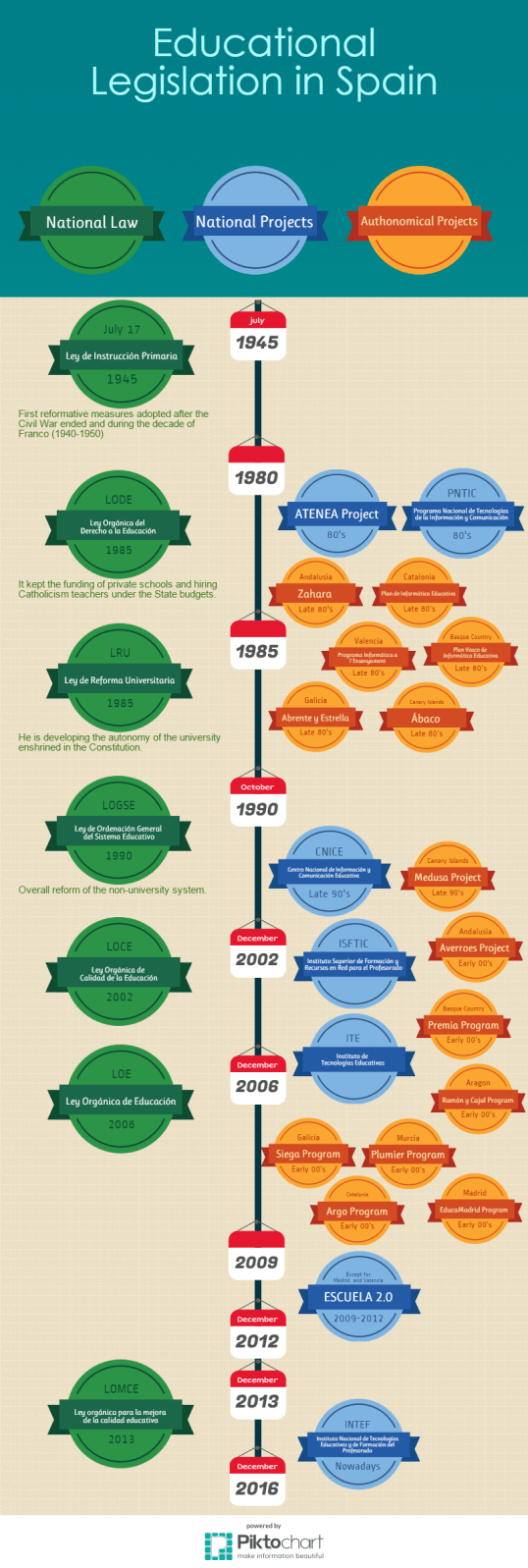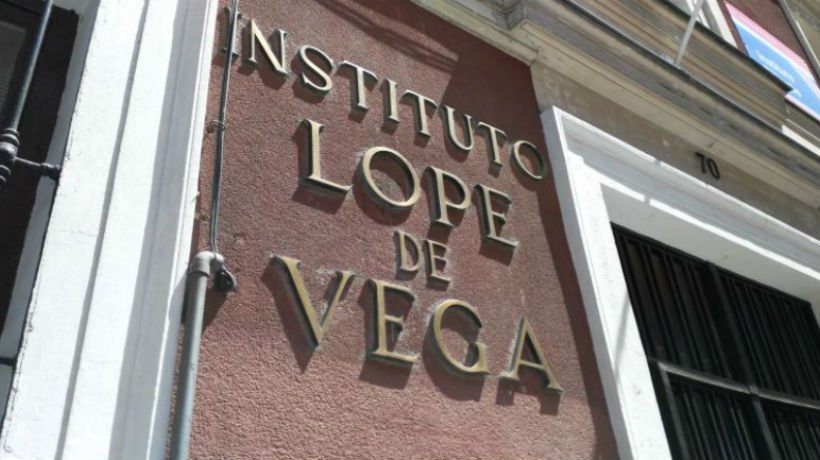Educational Legislation Guide To Content, Services, Or Technology Providers For Public Schools In Spain
Do you want to become a content, services, or technology provider for public schools in Spain? First, let's take a brief historical overview of the educational legislation, to understand the situation at the moment.
Legislation Historical Overview
- July 17, 1945: Ley de Instrucción Primaria (Primary Education Act). First reformist measures adopted under Franco after the Spanish Civil War.
- 1985: Ley Orgánica del Derecho a la Educación (Organic Law on the Right to Education) (LODE): Law that developed the right to education. It kept the funding of private schools that complement the public network, called concerted schools, and granted additional benefits, such as hiring Catholicism teachers under state budgets. Ley de Reforma Universitaria (University Reform Law) (LRU, 1985) developed the university autonomy enshrined in the Constitution.
- October 3, 1990: Ley 1/1990 de 3 de octubre de Ordenación General del Sistema Educativo (Law 1/1990 of October 3, on the General Organisation of the Education. System (LOGSE): Regulates the general reform of non-university system.
- December 23, 2002: Ley Orgánica 10/2002, de 23 de diciembre, de Calidad de la Educación (Organic Law 10/2002 of December 23 on Quality of Education) (LOCE).
- May 3, 2006: Ley Orgánica 2/2006, de 3 de mayo, de Educación (Organic Law 2/2006 of May 3, on Education) (LOE).
- November 28, 2013: The LOE was partially amended with the approval of the LOMCE Ley orgánica para la mejora de la calidad educativa (Organic Law for the improvement of educational quality), which entered into force during 2014/2015 and is in effect today.
It is possible that a new reform of the education law will take place after the election results of 2015, as it is included in the electoral program of several of the parties forming the new Spanish political landscape. This change will affect the educational curriculum, so if you want to provide digital educational content, you need to update your product specifications in order to fit in the resulting new legal framework.
Regarding the policies focused on the implementation of the Information Technology and Communications (ICT), at the level of central government, the following projects and programs have been carried out:
In the eighties of the twentieth century, the “ATHENA Project” is developed, and it is transformed shortly after into the "PNTIC" (National Program for Information Technology and Communication).
In the late nineties –when the educational responsibilities were transferred to the governments of the autonomous communities– the Ministry of Education created the CNICE (National Center for Education Information and Communication), that then became the ISFTIC (Superior Institute for Training and Online Resources for Teachers) and afterwards was transformed into the ITE (Institute of Educational Technology). Now it is called the INTEF (National Institute of Educational Technologies and Teacher Training).
Due to the decentralization of the Spanish state, regional governments of the various autonomous communities have been those who have developed specific policies for the provision of ICT resources and teacher training through specific programs and projects developed for its regional scope. In this way, rather than being an overall Spanish plan, there have been many independent plans and actions, that were exclusively developed for the territory of each autonomous community.
The role of these regional policies has been crucial, since they have been supporting the endowment of resources and ICT infrastructure in schools, plans for teacher training, the production of content and digital materials, and the promotion of pedagogical innovation projects.
Thus, from the Autonomous Communities we have developed the following:
In the late eighties, own plans were created to promote the use of computers in schools. The “Abrente” and “Estrela” in Galicia, the “Zahara” Plan in Andalusia, the “Basque Plan for Educational Computing”, the “Computer Program al'Ensenyament” of Valencia, the “Abaco” project in the Canary Islands or the “Computer Education plan” in Catalonia were some of the experiences developed.
With the advent of the internet, in the late nineties and early twenty-first century, the regional administrations promoted new programs and plans for the integration of digital technologies and network access in schools, as were the “Medusa project” in the Canary Islands, “Averroes” in Andalusia, the “Premia program” in the Basque Country, the “Ramón y Cajal” program in Aragon, “Plumier” in the region of Murcia, the “SIEGA project” in Galicia, “EducaMadrid” in the Madrid community, or the “Argo program” in Catalonia, among others.
In the 2009-2012 period, there was a significant change in ICT education policy approach developed in Spain. They came to rest on the 1-1 model (one computer per student) and the establishment of a minimum of coordination between the central government and regional governments. This change is carried out through “Escuela 2.0 Program” from 2009-10 by signing fifty/fifty founded agreements by the Ministry of Education and the local Government accordingly. In this program, most of the Spanish autonomous communities took part, except for the Madrid and Valencia Communities.
In the Valencian Community, the More-TIC Plan was introduced for widespreading the use of technological infrastructures as whiteboards, mobile classrooms, wi-fi networks, or thin clients in the teaching-learning process of the education centers subordinated to the regional Government.
In Madrid, the Plan for the Improvement and Modernization of information and communications technology was developed in all secondary education centers to improve their educational quality by acting on their ICT infrastructure.
The change of government in 2011 and the reduction of government expenditure as a result of the economic crisis caused the “Escuela 2.0 program” to be abolished in mid-2012.

Present Moment
At present moment, the acquisition of technological infrastructure and services can be done at the level of regional governments when it comes to small supplies, or national level when it comes to a global agreement.
At a regional and local level, the supply of ICT goods and services works through the various Departments of the Autonomous Communities through public tender and at the request of schools at a very small scale. In this case, the notices will be posted on the different Autonomous Bulletins.
This search engine offers the public tenders open today for the IT category for all the Autonomous Communities:
Tenders - Nationally, since September 2013 the acquisition of goods and technology services works through framework agreements and centralized contract through the Dirección General de Racionalización y Centralización de la Contratación (General Directorate of Rationalization and Centralization of Procurement (DGRCC), under the Undersecretariat of Treasury and Public Administration, within the Ministry of Finance and Public Administration. Until then, the central state purchases were made by a General Branch integrated into the General Directorate for State Assets.
The DGRCC is created following the Report of the Commission for Public Administration Reform (CORA) and to develop effectively centralized contracts and supplies services.
The creation of this General Directorate is hold by 696/2013 Royal Decree, of September 20, by which the 256/2012 Royal Decree of January 27 is modified, by which the basic organic structure of the Ministry of Finance and Public Administration is developed.
In 2014 and 2015, the DGRCC coordinated bidding aggregate purchases of computers and office software in collaboration with the General Directorate for Information Technology and Communications of the Ministry of Finance and Public Administration.
The framework agreement for the supply of personal computers and office software covers the provision of personal computers, laptops, tablets, monitors and office software. This agreement expires on 09.02.2016. There is a possibility of extension of up to two additional years.
Also in the DGRCC, files for the acquisition of equipment and systems for information processing are transacted, without having been declared of centralized procurement and that are offered by the organs, agencies, and organizations that are in scope of the Purchasing Central.
Through the centralized procurement portal, the DGRCC reports about existing contracts and contracts that will soon be tendered and that are detailed in the Annual Procurement Plan.
A guide to companies that are not yet engaged with the Administration is also offered, with the necessary steps to become a supplier of the General State Administration.
Through the Conecta Centralización application, it is possible to electronically do the various formalities related to the procurement of products and services available in the framework agreements in force (purchase requests of government agencies and request of product updates by contractors).
The DGRCC also has the Procurement Platform of the Public Sector, which provides the information necessary to contract with any public sector body. This platform allows companies to run a free registration via email to receive daily subscriptions of interest on tenders published in any website or public sector in the Official Journal of the European Union; to receive alerts on any novelty concerning selected tenders and to access electronic notifications from the contracting bids.
To stay informed of ICT awards, please consult this website: Tender and awarding ICT
To access ICT State reports and budgets, visit this page: Documentation
Finally, we would like to mention the Digital Transformation Plan of the General State Administration (AGE) and its Public Bodies (OO.PP), approved by the government in the Council of Ministers of October 2, 2015. This Plan is an initiative of the ICT Strategy Committee, by proposal of the Ministers of the Presidency, of Finance and Public Administration and of Industry, Energy and Tourism, on the basis of work prepared by the Directorate of Information Technology and Communications. The time period of the Plan ranges from 2015 to 2020 and its validity must be reviewed by the ICT Strategy Committee annually.
The Digital Transformation Plan is the strategic framework for the transformation of the Administration, establishing its guiding principles, objectives and actions to achieve them, as well as milestones for the gradual development of Digital Administration.
Through the eGovernment Observatory, the DATAOBSAE indicators are available to analyze the implementation and use of e-Government and ICT in public administration.









